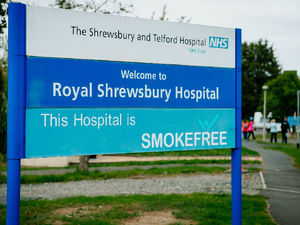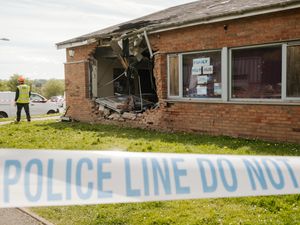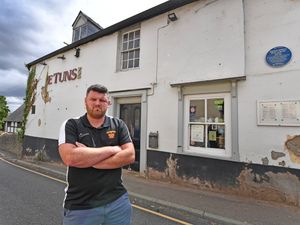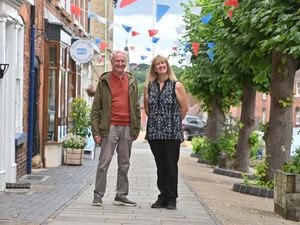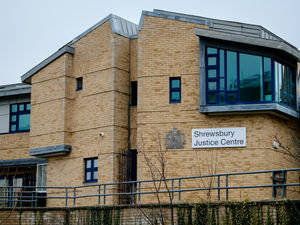More than 800 apply to be special constables in West Mercia Police unit
More than 800 people have applied to volunteer as special constables after a specialist recruitment unit was set up in October last year.
West Mercia and Warwickshire police forces are looking to add to the 600 part-time officers they employ at the moment, and have set up a specialist team to encourage more people to volunteer.
Special Sgt Philippa Jackman-Day, who herself joined the force as a volunteer in south Shropshire in 2013, says people from all walks of life volunteer to join the force. "We have all sorts, we have dentists, coach drivers, university students, teachers and company directors serving with us," she said.
Special constables are not paid, but have the same powers and responsibilities as regular police officers, and work alongside them on day-to-day operations.
During a recent visit to Shrewsbury, Home Secretary Theresa May praised the role of special constables in the police, saying they performed a valuable role in making our streets safer.
"A number of forces have been actively recruiting more specials, and I would like to see our police and crime commissioners looking at new ways of getting people who want to help with the policing of their local area," she said.
"Having voluntary help is also important because it brings in people who may have a different range of skills from outside policing."
Volunteer police give a bit extra

Sergeant Mike Turnbull remembers his first day out on patrol as a newly trained constable on the streets of Shrewsbury.
"I remember being in a police car with the blue lights flashing, chasing after somebody who had smashed up a car and run off," he says.
"When we got hold of them I thought 'wow, this is for real'."
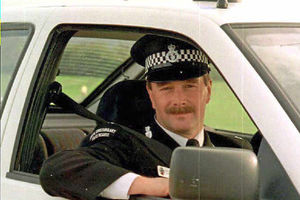
Special Constables are unpaid, part-time police officers who are drawn up from all walks of life – even formula one champions.
One of the most famous special constables was former Formula One world champion Nigel Mansell.
He joined up with Cornwall Police after his motor racing career ended, explaining: "My police work makes me realise what is happening in the world.
Restrictions
"Ignorance is very blissful and I'd suggest that if anybody was to spend a week going out with the police and see what they have to deal with on a day to day basis – and deal with so admirably – they would realise there is a lot more to life.
"I would say my feet are a lot more on the ground than many people."
Most people are eligible to join the special constabulary.
Sgt Philippa Jackman-Day said: "The only restrictions are you must be aged 18 or over, and you must pass a fitness test."
She says the fitness tests are not unduly strenuous, and there is no reason why a reasonably fit older person could not join the force she says.
"We have all sorts, we have dentists, coach drivers, university students, teachers and company directors serving with us," she says.
Special constables have the same powers, responsibilities and uniform as regular police constables, and are expected to commit to 16 hours a month, usually giving four hours a week.
They are not paid for their work, but receive full reimbursement for costs incurred for carrying out their duty.
After initial training, special constables will be attached to a tutor constable from nine-to-12 months, during which time they will complete a personal development portfolio covering various aspects of policing.
Once this is completed the officer will be signed off for independent patrol and will be able to apply to work with one of the following units, depending on availability:
Patrol the frontline uniformed team that respond to 999 and 101 calls as well as patrolling and dealing with any crime they come across
Safer Neighbourhoods the teams based at the local police stations dealing with community issues, anti-social behaviour and long term problems in specific areas.
Operational Policing Unit containing roads policing officers, authorised firearms officers and dog handlers, working both regularly on the frontline as well as deploying with pre-planned operations.
Criminal Investigation Department consisting of plain clothes officers dealing with burglaries, serious violence, sexual crimes and the management of prolific offenders.
Police Support Unit the public order unit that travel nationally to support other police services at football matches, protests and marches. They also respond to incidents of major disorder.
For fellow Sgt Philippa Jackman-Day, her first day was a little gentler, but no less important or challenging.
"I had an elderly lady with Alzheimer's, her neighbours hadn't seen her for a while and reported her missing," she remembers.
"She had gone out walking and forgotten how to get home. We had to go back to her property to help her, contact her nearest and dearest, and I helped social services bath her."
If this sounds like a pretty hectic introduction to life in uniform, there is another aspect to this which makes it sound all the more remarkable. They are both unpaid volunteers, who patrol the streets in their spare time. The pair, who both joined in September 2013, are members of the Special Constabulary, the volunteer arm of the regular police force. They receive the same training as full-time police officers, they have the same powers, and they serve alongside them on the same jobs. The only difference is that they do it in their own time and are not paid.
"There are a lot of misconceptions about what specials do," says Philippa, a 24-year-old mother of one who was working as an estate agent when she signed up.
"They think we are CSOs, but we are deployed in exactly the same way as regular officers, and our uniforms are exactly the same. When we arrive at an incident the public will be unable to see that we are specials, they will not see the difference and they will have the same expectations as they could for regular officers.
At the moment there are 600 specials employed across the West Mercia and Warwickshire forces, but there are ambitious plans to increase this number. In October a new specialist recruitment office was set up, headed by Inspector Adrian Davies, and staffed by three full-time recruitment officers, and the following month Philippa quit her job in property to join the new team, while still continuing as a volunteer officer.
She will not reveal how many specials the new unit is looking to recruit: "We have a target, but I wouldn't want to say any more than we are looking to increase the number significantly," she says. But the early signs are good, with 800 applications having been received since the unit was launched in October.
John Campion, the Conservative candidate to become West Mercia's new police and crime commissioner in May, has called for specials to receive some kind of remuneration for their time, in a similar way to how military reservists are now rewarded for their efforts. Both Mike and Philippa diplomatically avoid being drawn on this matter, simply pointing out that some specials have given more than 40 years' service without any financial rewards, and that they both do the job for no other reason than the love of it.
And whatever the political arguments on how best to achieve this end, the one thing that everybody seems agreed on is that specials will play an increasingly important role in the way that our streets are policed in future. Today specials can be deployed in specialist teams, be it with CID, community policing, or emergency response units, and it is even possible to work with firearms units and dog handlers.
"We don't give specials dogs or guns, but they do play a support role," says Philippa.
"People can usually choose which areas they want to work in."
Mike, who was last year presented with the Special of the Year honour at the Police and Crime Commissioner's Awards ceremony, says it was the lure of returning to uniformed service after leaving the Royal Navy which attracted to join the specials.
"I was working in an office job, and it was hard to adjust to, really hard," he says.
"I don't particularly like being stuck in an office all day, and I wanted to do something outside of my job, in the community. Being in the police in some ways is a similar sort of discipline."
For Mike, who like Philippa quit his office job for a full-time civilian role with the police, says in his case it was also to find out whether he wanted a career in the police.
"For me joining the specials was to see, in a way, if I wanted to do the job full-time or not, it was a way for me to see if I should apply for a full-time position when they are recruiting again. After two-and-a-half years I think the answer to that question would be yes.
Philippa adds: "I love the job, but it is not for everyone. If people don't like death or you don't like confrontation much, it's not going to be the job for you. "
Have there ever been occasions when they have become afraid?
"I don't think I have ever been frightened, in those situations the adrenaline kicks in and you have your colleagues around you. Most people who serve with the police will at some time talk about the police family, and it really is true, it is like one big family.
"The training is also very good. When I first went out, I was a bit nervous, but when you are confronted with a situation you just think through your training and put it into action."
Special officers are typically expected to commit to four hours a week out-of-pocket expenses are reimbursed.
For more information please visit ww.westmercia.police.uk/specialconstable

